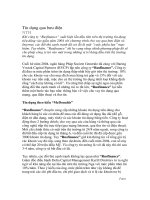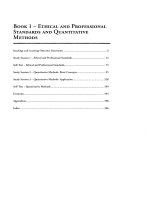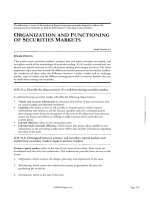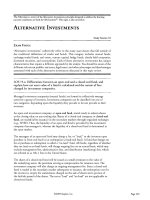Tài liệu Model Policy on Bank Deposits ppt
Bạn đang xem bản rút gọn của tài liệu. Xem và tải ngay bản đầy đủ của tài liệu tại đây (30.91 KB, 11 trang )
Model Policy on Bank Deposits
Preamble
One of the important functions of the Bank is to accept deposits from the public for the
purpose of lending. In fact, depositors are the major stakeholders of the Banking
System. The depositors and their interests from the key area of the regulatory
framework for banking in India and this have been enshrined in the Banking
Regulation Act, 1949. The Reserve Bank of India is empowered to issue
directives/advices on interest rates on deposits and other aspects regarding conduct
of deposit accounts from time to time. With liberalization in the financial system and
deregulation of interest rates, banks are now free to formulate deposit products within
the broad guidelines issued by RBI.
This policy document on deposits outlines the guiding principles in respect of
formulation of various deposit products offered by the Bank and terms and conditions
governing the conduct of the account. The document recognizes the rights of
depositors and aims at dissemination of information with regard to various aspects of
acceptance of deposits from the members of the public, conduct and operations of
various deposits accounts, payment of interest on various deposit accounts, closure of
deposit accounts, method of disposal of deposits of deceased depositors etc., for the
benefit of customers. It is expected that this document will impart greater
transparency in dealing with the individual customers and create awareness among
customers of their rights. The ultimate objective is that the customer will get services
they are rightfully entitled to receive without demand.
While adopting this policy, the bank reiterates its commitments to individual customers
outlined in the ‘Code of Banks Commitment to Customer’ adopted by the banks. This
document is a broad framework under which the rights of common depositors are
recognized. Detailed operational instructions on various deposit schemes and related
services will be issued from time to time. The Bank’s website will display the Banks
various deposit schemes and this website will be updated from time to time.
Types of Deposit Accounts
While various deposit products offered by the Bank are assigned different names.
The deposit products can be categorized broadly into the following types. Definition of
major deposits schemes is as under:-
i) “Demand deposits” means a deposit received by the Bank which is withdraw
able on demand.
ii) “Saving deposits” means a form of demand deposit which is subject to
restrictions as to the number of withdrawals as also the amounts of
withdrawals permitted by the Bank during any specified period.
iii) “Term deposit” means a deposit received by the Bank for a fixed period
withdrawable only after the expiry of the fixed period and includes deposits
such as Recurring/Term Deposits/Special Term Deposits etc.
iv) “Current Account” means a form of demand deposit wherefrom withdrawals
are allowed any number of times depending upon the balance in the
account or up to a particular agreed amount and will also include other
deposit accounts which are neither Saving Deposit nor Term Deposit.
v) “No Frills Account” means accounts with low minimum balance as well as
charges that makes a vast section of population accessible to bank
accounts.
Withdrawals
Withdrawals in account can be by way of Cheques, withdrawal forms, through the use
of ATM’s , by means of electronic transfer through Internet, by use of biometric cards,
by giving Standing Instructions to the Bank, , ECS Instructions or through any other
means which may come into usage after giving due notice on the Bank’s web-site.
Deposits
Deposits in account can be made by way of cash, cheques, electronic transfers, ECS,
as though any other means which may come into usage after giving due notice on the
Bank’s web-site.
Account Opening and Operation of Deposit accounts
A) The Bank before opening any deposit account will carry out due diligence as
required under “Know Your Customer” (KYC) guidelines issued by RBI Anti
Money Laundering Rules and regulations and or such other norms or
procedures as adopted by the Bank. While we have authorized Branch
Manager to take a decision with regard to opening an account, If the
decision to open an account of prospective depositors requires clearance at
a higher level, reasons for any delay in opening of the account will be
informed to him and the final decision of the Bank will be conveyed at the
earliest to him
B) The account opening forms and other material would be provided to the
prospective depositors by the Bank. The same will contain details of
information to be furnished and documents to be produced for verification
and or for record, it is expected of the bank official opening the account, to
explain the procedural formalities and provide necessary clarification sought
by the prospective depositor when he approaches for opening a deposit
account.
C) The regulatory guidelines require banks to categories customers based on
risk perception and prepare profiles of customers for the purpose of
transaction monitoring. Inability or unwillingness of a prospective customer
to provide necessary information/details could result in the bank not opening
an account.
D) Inability of an existing customer to furnish details required by the bank to
fulfill statutory obligations could also result in closure of the account after
due notice(s) is provided to the customer.
E) For Deposit products like Savings Bank Account and Current Deposit
Account, the bank will normally stipulate certain minimum balances to be
maintained as part of terms and conditions governing operations of such
accounts. Failure to maintain minimum balance in the account will attract
levy of charges as specified by the bank from time to time. For Savings
Bank Account the bank may also place restrictions on number of
transactions, cash withdrawals, etc. for given period. Similarly, the bank
may specify charges for issue of cheque books, additional statement of
accounts, duplicate passbook, folio charges, etc. All such details, regarding
terms and conditions for operation of the account and schedule of charges
for various services provided will be communicated to the prospective
depositor while opening the account. However, amount in withdrawal form
and cheque for cash withdrawal should be in round rupees.
F) Saving Bank Accounts can be opened for eligible person/persons and
certain organizations/agencies (as advised by Reserve Bank of India from
time to time).
G) Current Accounts can be opened by individuals/partnership firms/Private
and Public Limited Companies/HUFs/Specified Associates/Societies/Trusts
etc.
H) Term deposits Accounts can be opened by individuals/partnership
firms/Private and Public Ltd. Companies/HUFs/Specified
Associates/Societies/Trusts, etc.
I) The due diligence process, while opening a deposit account will involve
satisfying about the identity of the person, verification of address, satisfying
about his occupation and source of income. Obtaining introduction of the
prospective depositor from a person acceptable to the Bank and obtaining
recent photograph of the person/s opening/operating the account are part of
due diligence process. Under the latest KYC norms, introduction is
necessary for account opened under the liberalized KYC norms
J) In addition to the due diligence requirements, under KYC norms the Bank is
required by law to obtain Permanent Account Number (PAN) or General
Index Register(GIR) Number or alternatively declaration in Form No. 60 or
61 as specified under the Income Tax Act/Rules.
K) Deposit accounts can be opened by an individual in his own name (status:
known as account in single name) or by more than one individual in their
own names (status: known as Joint Account). Savings Bank Account can
also be opened by a minor jointly with natural guardian or with mother as
the guardian (Status: known as Minor’s Account). Minors above the age of
10 will also be allowed to open and operate saving bank account
independently. However, no overdrafts will be granted to these minors.
L) Operation of Joint Account -The Joint Account opened by more than one
individual can be operated by single individual or by more than one
individual jointly. The mandate for operating the account can be modified
with the consent of all account holders. The Saving Bank Account opened
by minor jointly with natural guardian/guardian can be operated by such
guardian only.
M) The joint account holders can give any of the following mandates for the
disposal of balance is in the above accounts.
i) Either or Survivor : If the account is held by two individual say, A & B, the
final balance along with interest, if applicable, will be paid to survivor on
death of anyone of the account holders.
ii) Anyone or Survivor/s : If the account is held by more than two individuals
say, A, B and C, the final balance along with interest, if applicable, will be
paid to the survivor on death of any two account holders.
iii) Former or Survivor: If the account is held by two individuals say, A&B, the
final balance along with interest , if applicable, will be paid to A on death of
B. Similarly in case of death of A it will be paid to B.
iv) Latter or Survivor: If the account is held by two individuals say, A&B, the
final balance along with interest, if applicable, will be paid to B on the death
of A. Similarly in case of death A it will be paid to B.
The above mandate for opening joint accounts/disposal of balances
become operational from the date deposit account is opened. This mandate
can be modified by the consent of all the account holders.
N) At the request of the depositor, the Bank will register mandate/power of the
attorney given by him authorizing another person to operate the account on
his behalf.
O) The term deposit account holders at the time of placing their deposits can
give instructions with regard to closure of deposit account or renewal of
deposit for further period on the date of maturity. In case of absence of any
Instructions deposits will be treated as an auto renewal deposit and should
be renewed for a similar period.
P) Nomination facility is available on all deposit account opened by individuals.
Nomination is also available to an account opened by a sole proprietor;
Nomination can be made in favour of one individual only. Nomination so
made can be cancelled or changed by the account holder/s any time. While
making nomination, cancellation or change thereof, it is required to be
witnessed by a third party. Nomination can be modified by the consent of
account holder/s. Nomination can be made in favour of a minor also.
Q) Bank recommends that all depositors avail nomination facility. The nominee
in the event of death of the depositor/s would receive the balance
outstanding in the account as a trustee of legal heirs. The depositor will be
informed of the advantages of the nomination facility while opening a
deposit account.
R) A statement of account will be provided by the Bank to Savings Bank as
well as Current Account Depositors periodically as per terms and conditions
of opening of the account. Alternatively, the Bank may issue a Pass Book
to these account holders. The Bank under the financial inclusion initiative
has introduced Smart Card which stores the details of the account. The
Bank may also provide a statement of account if required at a small fee.
S) The deposit accounts may be transferred to any other branch of the Bank at
the request of the depositor.
Interest Payments
i) Interest shall be paid on saving account at the rate specified by Reserve
Bank of India directive from time to time. However, term deposit interest
rates are decided by the Bank within the general guidelines issued by the
Reserve Bank of India from time to time.
ii) In terms of Reserve Bank of India directives, interest shall be calculated at
quarterly intervals on term deposits and paid at the rate decided by the
Bank depending upon the period of deposits. In case of monthly deposit
Scheme, the interest shall be calculated for the quarter and paid monthly at
discounted value. The interest on term deposits is calculated by the Bank in
accordance with the formulae and conventions advised by Indian Banks’
Association. Interest on Term Deposits are also paid on calendar quarter
basis.
iii) The rate of interest on deposits will be prominently displayed in the branch
premises. Changes, if any, with regard to the deposit schemes and other
related services shall also be communicated upfront and shall be
prominently displayed.
iv) The Bank has statutory obligation to deduct tax at source if the total interest
paid/payable on all term deposits held by a person exceeds the amount
specified under the Income Tax Act. The Bank will issue a tax deduction
certificate (TDS Certificate) for the amount of tax deducted. The depositor,
if entitled to exemption from TDS can submit declaration in the prescribed
format at the beginning of every financial year. The declaration filed in Form
15G and 15H u/s 197A shall not be valid unless the person, filing the
declaration furnishes his PAN in such declaration. In case of failure to do
the same, tax is deducted at the rate mentioned in the relevant provisions of
the IT Act or at the rate in force or at the rate of 20% which is higher.
Minor’s Accounts
i) A minor can open Savings Bank Account and the same can be operated by the
natural guardian or by minor himself/herself, if he/she is above the age of 10 years
and can sign uniformly. The account can also be opened jointly with guardian.
ii)On attaining majority, the erstwhile minor should confirm the balance in his/her
account and if the account is operated by the natural guardian/guardian, fresh
specimen signature or erstwhile minor duly verified by the natural guardian would be
obtained and kept on record for all operational purposes.
Accounts of illiterate/Blind Person
An illiterate person may open an ordinary Savings Bank Account in his sole name or
jointly with other person(s).The Bank may at its discretion open deposit accounts other
than Current Accounts of an illiterate person. The account of such person may be
opened provided he/she calls on the Bank personally along with a witness who is
known to both the depositor and the Bank. Normally, no cheque book facility is
provided for such Savings Bank Account. At the time of withdrawal/repayment of
deposit amount and/or interest, the account holder should affix his/her thumb
impression or mark in the presence of the authorized officer who should verify the
identity of the person. The Bank will explain the need for proper care and safe
Keeping of the passbook etc. given to the account holder. The Bank official shall
explain the terms and conditions governing the account to the Illiterate/Blind person.
Accounts of Physically Impaired Persons
A Physically Impaired Person may open an ordinary Savings Bank Account in his sole
name or jointly with other person(s). The Bank may at its discretion open deposit
accounts other than Current Accounts. The account of such person may be opened
provided he/she calls on the Bank personally along with the witness who is known to
both the depositor and the Bank. Guardianship Certificate issued either by the District
Court under Mental Health Act, 1987 or by the Local Level Committee under the
National Trust for the welfare of the persons with Autism, Cerebral Palsy, Mental
Retardation and Multiple Disabilities Act, 1999 is required for the purpose of opening
/operating accounts.
Account of Visually Impaired Persons
A Visually Impaired Persons may open an ordinary Savings Bank Account in his sole
name or jointly with other person(s). The Bank may at its discretion open deposit
accounts other than Current Accounts of visually impaired person. The account of
such person may be opened provided he/she calls on the Bank personally along with
the witness who is known to both the depositor and the Bank. Visually Impaired
persons can open cheque book operated accounts after fulfilling the requirement of
the Bank.
Addition or deletion of the name/s of joint account holders
The bank may at the request of all the joint account holders allow addition or deletion
of name/s of joint account holder/s if the circumstances so warrant or allow an
individual depositor to add the name of another person as a joint account holder.
Customer information
The customer information collected from the customers shall not be used for cross
selling of services or products by the Bank, their subsidiaries and affiliates. If the
Bank proposes to use such information, it should be strictly with the consent of the
account holder.
Secrecy of customer’s accounts
The Bank shall not disclose details/particulars of the customer’s account to a third
person or party without the expressed or implied consent from the customer.
However, there are some exceptions, viz disclosure of information under compulsion
of law, where there is a duty to public to disclose and where interest of the Bank
requires disclosure.
Premature withdrawal of term deposit
The Bank on request from the depositor, at its discretion may allow withdrawal of term
deposit before completion of the period of the deposit agreed upon at the time of
placing the deposit. The Bank shall declare their penal interest rates policy for
premature withdrawal of term deposit. The Bank shall make depositors aware of the
applicable rate along with the deposit rate. In case of joint account premature
withdrawal of Term Deposit will depend on the mandate given by the depositors jointly
at the time of opening the Term Deposit
Premature renewal of term deposit
In case the depositor desires to renew the deposit by seeking premature closure of an
existing term deposit account, the bank will permit the renewal at the applicable rate
on the date of renewal, provided the deposit is renewed for a period longer than the
balance period of the original deposit. While prematurely closing a deposit for the
purpose of renewal, interest on the deposit for the period it has remained with the
Bank will be paid at the rate applicable to the period for which the deposit remained
with the bank and not at the contracted rate.
Renewal of overdue term deposits
When a term deposit is renewed on maturity, on renewed deposit interest rate for the
period specified by the depositor as applicable on the date of maturity would be
applied. If request for renewal is received after the date of maturity, such overdue
deposits will be renewed with effect from the date of maturity at interest rate applicable
as on the due date, provided such request is received within 14 days from the date of
maturity. In respect of overdue deposits renewed after 14 days from the date of
maturity, interest for the overdue period will be paid at the rates decided by the Bank
from time to time.
It has been currently decided that in the absence of any instruction for disposal of the
maturity proceeds of the Term Deposits, the deposit will be renewed for the period
originally opened at the rate applicable at the time of renewal.
Advances against deposits
The Bank may consider request of the depositor/for loan/overdraft facility against term
deposits duly discharged by the depositor/s on execution of necessary security
documents. The Bank may also consider loan against deposit standing in the name of
minor, however, a suitable declaration stating that loan is for the benefit of minor, is to
be furnished by the depositor-applicant.
Settlement of dues in deceased deposit account
i) If the depositor has registered nomination with the Bank;- the balance outstanding in
the account of the deceased depositor will be paid to the nominee after the Bank
satisfies about the identity of the nominee, etc
ii) The above procedure will be followed even in respect of a joint account where
nomination is registered with the Bank.
iii) In a joint deposit account, when one of the joint account holders dies, the Bank is
required to make payment jointly to the legal heirs of the deceased person and the
surviving depositor (s). However, if the joint account holders had given mandate for
disposal of the balance in the account in the forms such as “either or survivor.
Former/latter or survivor, anyone of survivors or survivor; etc., the payment will be
made as per the mandate to avoid delays in production of legal papers by the heirs of
the deceased.
iv) In the absence of nomination and when there are no disputes among the claimants,
the Bank will pay the amount outstanding in the account of deceased person against
joint application and indemnity by all legal heirs or the person mandated by the legal
heirs to receive the payment on their behalf without insisting on legal documents up to
the limit approved by the bank’s board. This is to ensure that the common depositors
are not put to hardship on account of delays in completing legal formalities.
Interest Payable on term deposit in deceased account
i) In the event of death of the depositor before the date of maturity of deposit and
amount of the deposit is claimed after the date of maturity, the Bank shall pay interest
at the contracted rate till the date of maturity. From the date of maturity to the date of
payment, the bank shall pay simple interest at the applicable rate obtaining on the
date of maturity, for the period for which the deposit remained with the Bank beyond
the date of maturity; as per the bank’s policy in this regard.
ii) However, in the case of death of the depositor after the date of maturity of the
deposit, the bank shall pay interest at savings deposit rate obtaining on the date of
maturity from the date of maturity till the date of payment.
Insurance Cover for Deposits
All bank deposits are covered under the insurance scheme offered by Deposit
Insurance and Credit Guarantee Corporation of India (DICGC) subject to certain limits
and conditions. The detail of the insurance cover in force will be made available to the
depositor.
Stop Payment Facility
The Bank will accept stop payment instructions from the depositor in respect of
cheques issued by them. Charges, as specified, will be recovered.
Dormant Accounts/Inoperative Accounts
Accounts which are not operated for a considerable period of time will be transferred
to a separate dormant/inoperative account status in the interest of the depositor as
well as the bank. The depositor will be informed of charges, if any, which the Bank will
levy on dormant/inoperative accounts. The depositor can request the Bank to activate
the account for operating it.
Redressal of complaints and grievance
Depositors having any complaints/grievance with regard to services rendered by the
Bank has a right to approach authority (ies) designated by the Bank for handling
customer complaint/grievances. The details of the process set in place is as under:-
I)A standardized complaint registers (perforated 3 copies) is available at branches and
kept at prominent place in the branches which would make it possible for the
customers to enter their complaints.
ii) A system of acknowledging the complaints is available where the complaints are
received through letters/forms.
iii)Fixed a “time frame” for resolving the complaints received at different levels.
iv) The names of the officials who can be contacted for redressal of complaints,
together with their direct telephone number, fax number, complete address (not Post
Box No.) and e-mail address etc. for proper and timely contact by the customers and
for enhancing the effectiveness of the redressal mechanism is prominently displayed
at the branches.
In case the depositor does not get response from the Bank within 30 days from date of
complaint or he not satisfied with response received from the Bank. He has a right to
approach Banking Ombudsman appointed by the Reserve Bank of India.









